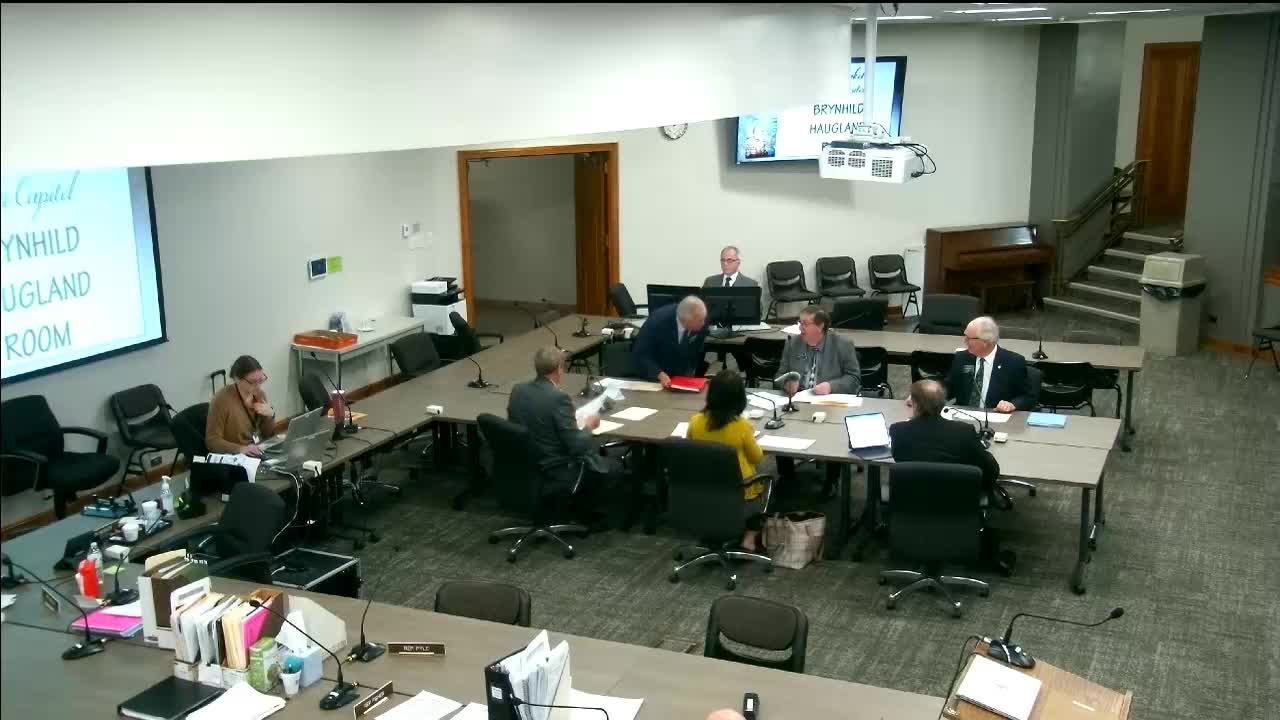Conference committee outlines funding changes for Agriculture Commissioner budget
Get AI-powered insights, summaries, and transcripts
Subscribe
Summary
A conference committee reviewing the Agriculture Commissioner's 01/2009 budget described several changes including a new FTE for plant protection, restored grape-and-wine funding, a pilot predator-control allocation, continued food pantry grants, a $500,000 autonomous-technology grant, and returning a bioscience carryover to the general fund.
A conference committee meeting of House and Senate conferees reviewing the Agriculture Commissioner's 01/2009 budget described a package of amendments that add one full-time equivalent position for plant protection, move several trade and program appropriations from one-time to ongoing status, and reallocate a carryover from the Bioscience Innovation Grant Fund back to the general fund.
The committee’s changes include an added FTE for plant protection to meet rising demand for phytosanitary inspections, a $250,000 reduction to a requested state-fleet increase (leaving $500,000 in the budget), restoration of $80,000 for the grape-and-wine program, a $150,000 allocation for a pilot predator-control program targeting coyotes, continuation of $2,000,000 in food-pantry grants (funded from the State Investment Fund for the current proposal), and a $500,000 grant for autonomous-technology research to build an optical library to identify weeds such as Palmer amaranth and waterhemp for targeted spraying. The Senate conferee also said the $1,030,000 carryover in the Bioscience Innovation Grant Fund will be returned to the general fund for now, with intent to revisit restructuring the program in a future session.
“we added an FTE for plant protection,” the Senate conferee explained, saying demand for phytosanitary certificates — which are necessary for many overseas shipments of plants and seed products — has increased and that inspections for hemp and prior inspections have also grown. The conferee told the committee the additional staff will address that demand; funding for the position was identified as coming from the Herb Fund.
Representative Meyer asked whether the Department of Agriculture already performs the inspections the new FTE would do; the conferee responded that the Department currently conducts them but that workload has increased as more product shipments require certification. Meyer also asked about the geographic focus of the predator-control pilot; the conferee said the proposal is intended to be statewide.
On fleet spending, the committee trimmed a requested increase from roughly $750,000 to $500,000, citing recent declines in fuel prices and the option of addressing additional needs through a future deficiency request if required. The grape-and-wine program’s $80,000 base funding was restored after having been removed earlier in the process.
The conferee said wildlife services would receive $150,000 from ERP funds to support a pilot predator-control initiative, described as funding for a plane and an operator and for a shooter focused on coyote control. Committee members described widespread coyote activity across the state and emphasized concerns for livestock losses during calving and lambing seasons.
Food-pantry funding was discussed as a continuation of past meat-protein support: last session the program used a mix of federal dollars and State Investment Fund (SIF) money; the conferee said the current proposal restores the $2,000,000 protein-oriented grants entirely from SIF because the previous federal contribution is no longer available. “This is specific to meat protein, and that’s the thing that they’re the shortest of,” the conferee said, explaining why the committee sought to keep the protein component whole.
The committee also moved previously one-time appropriations for the North Dakota trade office (APOC/trade office dollars) into ongoing status, noting those expenditures have been made repeatedly in past budgets and the conferees judged them to function as ongoing programs rather than one-time items. The conferee said approximately $400,000 that had been counted as one-time in the last cycle is being recognized as part of the base going forward.
Regarding the Bioscience Innovation Grant Fund, the conferee described roughly $1,030,000 in carryover that the Senate would return to the general fund at leadership’s direction, with plans to attempt a program restructure in a future session.
The committee did not record a formal roll-call vote during the meeting; members discussed the package and agreed to schedule another conference committee to continue negotiations. The chairman closed the meeting after conferees confirmed the changes and noted further work with other conferees would follow.
The discussion combined budget-line clarifications, funding-source shifts, and pilot program proposals rather than final enacted changes; several items will return to conference for further negotiation and any funds dependent on external grants or federal dollars were described as contingent on those sources remaining available.
